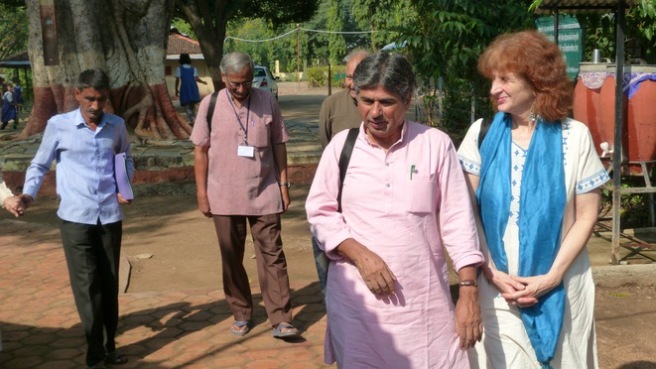
My daily news feed is utterly depressing: the world we live in appears to be increasingly ruled by violence, injustice, and might-is-right thinking. It’s a cynical world, where lies and deception have become the new normal. But there is a resistance, and recently I was privileged to meet one of its leading proponents, Jill Carr-Harris. With her husband, PV Rajagopal, she is one of the leaders of the Gandhian movement in India.
When we met in Bhopal at the house of a mutual friend, Jill and I found we had a lot in common. We are about the same age and, despite being born in Canada and Belgium respectively, we both feel “Indian at heart,” have married Indian citizens, have adopted local customs, are fluent in Hindi, and delight in wearing traditional Indian clothing, especially khadi (handspun, hand-woven natural fiber) fabrics.
Over the last three decades, Jill’s husband Mr. Rajagopal, affectionately known as Rajaji, has worked tirelessly to improve the lot of the oppressed, the dispossessed, landless, and powerless, proving in the process that, more than 70 years after Mahatma Gandhi’s death, his principles are still very much alive and… working.
“Between silence and violence is active nonviolence.” –PV Rajagopal
Starting at the grassroots, Rajagopal trained thousands of rural young people as community leaders, whose activities in several Indian states eventually led to national actions. In 2007, 25,000 landless poor, mainly tribals, marched 350 kilometers (217 miles) from Gwalior in Madhya Pradesh to the capital, New Delhi, to demand the land reforms promised them at Independence (1947). The action succeeded in bringing about the implementation of the Forest Rights Act.
In 2012 a second such march, this time of 100,000 people, was organized to demand people’s control over land and livelihood resources, resulting in a ten-point agreement with the Government of India.
In 2018 Rajagopal came up with an even more ambitious plan: to mobilize one million people to nonviolently claim their livelihood rights. After a year of planning and preparations, the movement is now poised to take Gandhi’s message across the globe and spread his ideals of peace and nonviolence. The scope, this time, is truly mind boggling.
Starting in New Delhi on October 2, 2019 – Gandhi’s 150-year birth anniversary – the year-long march will span 10,151 kilometers (a whopping 6,307 miles!) on three continents, culminating in a global action forum at Geneva, from 26 September through 2 October 2020. Participants committed to nonviolent change all over the world will march from India, Belgium, France, Germany, Sweden, Senegal, Spain, and other countries, to Switzerland.
The project is dubbed Jai Jagat, Victory of the World, and it is intended to be a victory for our common humanity, helping us to refocus on an inclusive world based on principles of peace and justice. (www.jaijagat2020.org.) The city of Geneva will welcome the marchers for eight days of action, where issues facing local people worldwide will be addressed with global institutions and policy makers.
For me, this is a glimmer of hope, a sign that the forces of good, the true proponents of peace and justice, still have a chance to make our world a better place for us all. We ask our leaders to, for once, listen to the people, not to the demands of the war industry, to abandon the cynical view that destruction and reconstruction will boost the economy. We beg our governments to resist the blame games, warmongering, and arms races all over the globe. Only social justice can lead to lasting peace. Only peace can lead to lasting prosperity.
P.S. Jill has agreed to take time off from her busy schedule for an interview. It will appear on this blog soon.
If you are a journalist or blogger, I invite you to share both this article and the upcoming interview with as many news outlets as you can.
